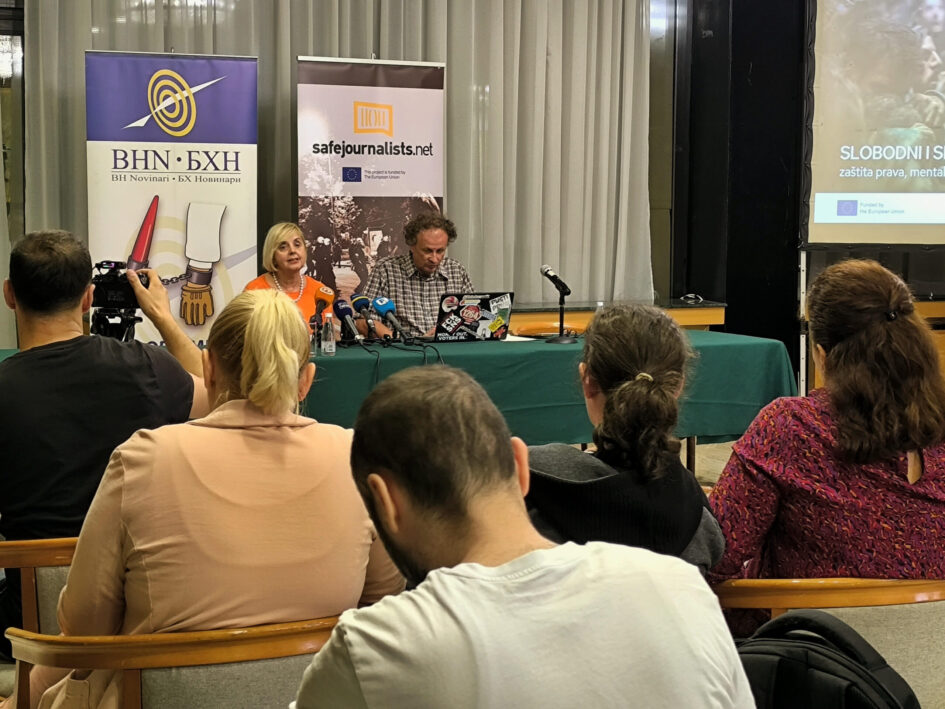
Every tenth journalist in BiH has been diagnosed with a mental disorder due to the stressful work they do, while 40 percent of journalists use tranquilizers, this is stated in a study on the mental health of journalists in BiH, conducted by the non-governmental organization Proeduca, in cooperation with Safejournalist and BH journalists.
What is the safety and freedom of journalists in BiH?
She was threatened, intimidated, persecuted, and arrested, just because she does her job – the job of a journalist. But regardless, Nataša Miljanović Zubac will not give up.
“First of all, I love journalism, it is a great profession, it is a little devalued, but we need to bring this profession back to where it should be. I am used to stress, I monitor the danger of who is around me, a person becomes related to the situation he finds himself in, at first it was certainly not pleasant, because I don’t know what to expect even now. We have all seen what they have prepared for me, but I am ready for every possible scenario, even maybe someone to kill me,” said Nataša Miljanović Zubac.
Nataša is not the only journalist who is exposed to threats, intimidation and even physical attacks almost on a daily basis. Data published by non-governmental organizations in a study on the mental health of journalists in BiH showed devastating data, from mobbing, depression, anxiety, to the use of tranquilizers.
“4.4 percent of journalists use tranquilizers regularly, and 33.9 percent sometimes. 40 percent means they use tranquilizers. But every second one said that they have experienced either insults or threats in various ways. Journalists are not robots who receive threats so often, a good part of them have to process it internally, and this leaves consequences on their psychosomatics, said Srđan Puhalo, a researcher on the project.
The research also stated that more than 67 percent of media workers, mostly journalists, confirmed that they were forced to seek psychological help due to stress, and that the main causes of stress are job uncertainty, underpayment, personal relationships in the team, and external pressures.
“Journalists are increasingly registering with the helpline for journalists and, in addition to legal assistance, are requesting psychological and medical assistance. In previous years, we were also able to pay for some of the medical examinations and pay for medications for journalists,” said Borka Rudić, Secretary General of the Association of BH Journalists.
Journalists across the region and Europe are also facing intimidation and threats, warns the president of the European Association of Journalists. She says that many journalists give up their jobs precisely because they cannot withstand the pressures and threats, and adds that all this makes their work even more difficult.
“Our task is to investigate, to warn, to report, we need to ask the people around us whether we want to be informed by social media algorithms, whether we want to be informed by people who will use disinformation for their own interests, or by people who have been trained to report truthfully, professionally and objectively, and then as such they become targets of disgusting attacks that lead us to the point where we need professional help and need to take tranquilizers,” said Maja Sever, president of the European Association of Journalists.
Last year, 266 warnings were recorded, including physical attacks, intimidation, detention, impunity and other restrictive actions against journalists in Europe. For example, in terms of the number of attacks on journalists, intimidation and other cases of threats to media freedom reported to the Council of Europe’s Platform for the Safety of Journalists, Serbia ranks fourth, after Ukraine, Russia and Turkey.
Source: Melisa Teletović/Euronews.ba
Photo: BH Journalists, private archive



